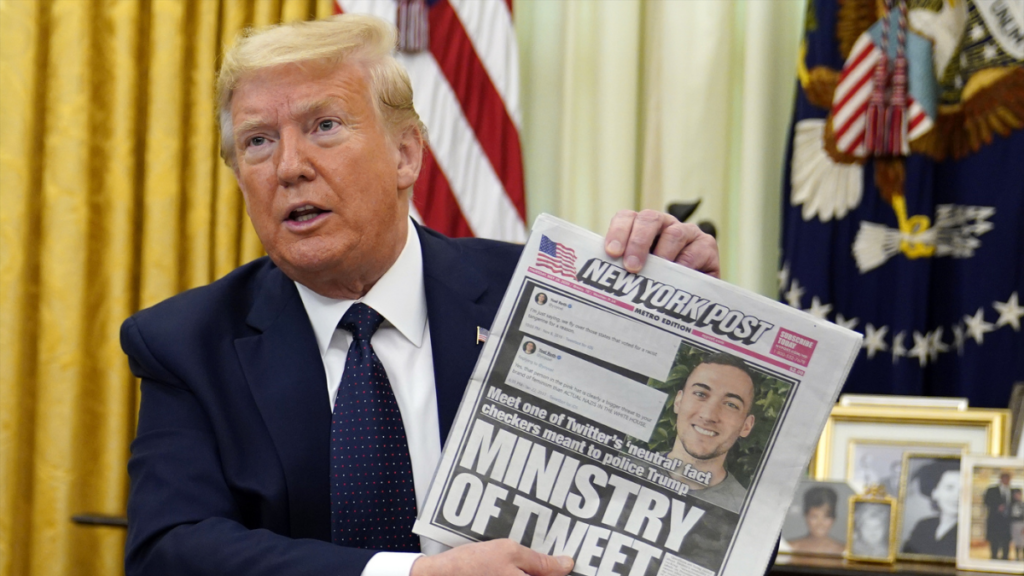President Donald J. Trump is arguably the most persistent “counter puncher” in the history of American politics. When he feels he has been attacked or treated poorly, he lets the world know about it and, to the maximum extent possible, looks for ways to punch back. Since he is the head of government, the options at his disposal are vast. This may soon become crystal clear to the executives at Twitter.
Donald Trump has been a master at using the Twitter platform as a vehicle to communicate his thoughts, rile his base, anger his enemies and dominate the news cycle. He’s been an active user of the platform since 2009 and has issued tens of thousands of tweets and retweets over the years. There are over 80 million followers of his @realDonaldTrump account, and another 30 million followers of his official White House account @POTUS.
For years, the left has attacked Trump for his massive use of Twitter. Countless articles have been written claiming that he uses Twitter to troll his opponents, and alleging he frequently retweets posts from fake accounts or fringe sources. Repeated demands have been made of Twitter CEO Jack Dorsey to censure Trump, or even kick him off the platform entirely. Under Nancy Pelosi’s leadership, Democrats in the House of Representatives formally voted to censure President Trump in 2019 for “racist comments” on Twitter saying that four members of the House (members of the so-called “Squad”) should “go back to your own country.”
Through all these controversies, Twitter has declined to take action against their most famous user, even though they regularly censure other prominent conservative voices and even suspend or delete their accounts. The calls to ban at least some Trump tweets escalated in recent days when the president gave voice to the theory that MSNBC Morning Joe co-host Joe Scarborough may have had something to do with the death of a young female staffer many years ago when he served in the House of Representatives. Even as that controversy played out, Trump continued to use the Twitter platform to share his views, including a series of tweets where he said that the Democrats demand to rely on mail balloting in the November election would result in massive voter fraud and was designed to help them rig the election.
The voter fraud claim seems to have been the proverbial straw that broke the camel’s back. For the first time ever, Twitter added a “Fact Check” label to two of Trump’s tweets. The label warns readers to “Get the facts about mail in ballots” and directs them to a page saying the president’s claims are not true.
Get ready for the counter punch.
According to media reports, President Trump is set to issue an executive order to federal agencies to study whether social media platforms like Twitter and Facebook can be held legally liable for content they allow users to post. Whether it comes about or not, it’s a very powerful sign to social media platforms that if they want to get in the business of regulating the content of what users can post, they will need to take on the legal liability for posts that they allow, and those they don’t allow. If this were ever to happen, it would cripple Twitter, Facebook and other social media platforms.
Other conservative commentators have reacted to the censuring of conservative groups and voices with calls for mandatory “open access” rules that prohibit companies from censoring content. Others have advocated sweeping federal rule changes to regulate social media platforms like the FCC licenses and regulates television and radio stations. Still others have suggested that they be treated like public utilities where their operations are strictly regulated by commissions with the authority to prevent discrimination and anti-competitive actions against consumers.
Whatever comes of President Trump’s counter punch against Twitter, Facebook and the others remains to be seen. One thing is certain, though. The public debate going forward – one sure to impact the 2020 elections – is not going to be only about whether voter fraud will rise through the use of mail in ballots and the “ballot harvesting” procedures used by Democrats in blue states like California. The debate will include, and likely become a more dominant topic, whether we should tolerate social media platforms censuring the content of conservative groups and voices and whether these companies should be regulated to ensure a fair and even playing field.
This is not a debate that will go well for Twitter, Facebook and the rest of them. They have only themselves to blame.
